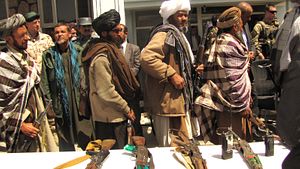The Afghan peace process took a step forward on Monday, with Pakistan hosting four-nation talks trying to create a roadmap for restarting peace negotiations between the Afghan Taliban and the Afghan national government (our own Ankit Panda gave a preview of the talks this weekend). China, along with Afghanistan, Pakistan, and the United States, makes up the Quadrilateral Coordination Group.
China’s top representative at Monday’s talks was Special Envoy on Afghan Affairs Deng Xijun. Other high-ranking attendees included Afghan Deputy Foreign Minister Hekmat Karzai, Pakistani Foreign Secretary Aizaz Chaudhry, and Richard Olson, the U.S. special representative for Afghanistan and Pakistan.
China’s inclusions in the talks on Monday signals its growing involvement in the Afghan peace process. The four countries represented at the discussion are seen as crucial to ensuring the success of any negotiations with the Taliban, in part because of China’s clout with its “iron brother,” Pakistan. Islamabad’s involvement (not to mention a commitment to depriving the Afghan Taliban of support) is crucial to actually bringing the militant group to the table.
China was intimately involved in the first attempt at peace talks last year. Beijing quietly hosted representatives of the Taliban to help pave the way for the talks, which unraveled in the summer of 2015. The Taliban, which publicly announced the death of Mullah Omar for the first time, faced an internal power struggle; meanwhile, Afghanistan’s trust in Pakistan was badly shaken after deadly terrorist attacks in Kabul in August.
Though the 2015 round of talks came to nothing, Beijing soon showed it was determined to try again. Foreign Minister Wang Yi, China’s representatives at the Heart of Asia ministerial conference in December, called on all “relevant countries” to contribute to seeing the peace talks restarted. Wang also offered China’s help in building “a platform for the revival of Afghanistan’s reconciliation process.” On the sidelines of the Heart of Asia conference, Wang held individual meetings with Afghan President Ashraf Ghani and Pakistani Prime Minister Nawaz Sharif, as well as a four-party meeting bringing together Afghanistan, China, Pakistan, and the United States – the same grouping that met more formally on Monday in Islamabad.
Hong Lei, a spokesperson for China’s Foreign Ministry, said in a regular press conference on Monday that “China supports ‘the Afghan-led, Afghan-own[ed]’ reconciliation process, and stands ready to play a constructive role to that end.”
“On the premise of respecting Afghanistan’s sovereignty and the will of all sides, China will work with all parties to support and help relaunch peace talks inside Afghanistan,” Hong added.
China, which shares a short border with Afghanistan, is concerned about a rise in militancy and extremism in the country spilling over into its western Xinjiang province. China has had its own troubles with stability in Xinjiang province, and is loath to see Afghanistan turn into a potential safe-haven for terrorists and extremists. Plus, China’s grand plans for a “Silk Road Economic Belt” linking its central and western regions with Europe will live or die based on the security situation in Afghanistan and Pakistan.
Meanwhile, however, China’s hallowed principle of ‘non-interference’ in other countries’ affairs means it treads carefully with respect to mediation – thus Beijing’s repeated emphasis on the peace talks being “Afghan-led” and “respecting Afghanistan’s sovereignty.” Ghani himself courted China to help support Afghan stability upon taking office in September 2014, providing an open door for China’s participation in setting up peace talks with the Taliban.
Peace talks will be difficult, even with the four states represented at Monday’s talks all on board. The Taliban itself is fractured into different factions, some of which might support peace talks and some of which have already rejected the idea out of hand. Last summer, the terrorist attacks in Kabul helped kill any lingering hopes over that round of negotiations with the Taliban; similar attacks by Taliban factions not participating in the talks could once again derail the process.
Sartaj Aziz, foreign affairs advisor to Prime Minister Sharif, cautioned that preconditions – including threatening the use of military force against “irreconcilables” – would be “counterproductive,” according to Reuters. That stance, however, would seem to counter other reports that Pakistan has agreed to work with Afghanistan to use force against Taliban factions that do not join the talks.
According to Al Jazeera, the Quadrilateral Coordination Group will hold another meeting on January 18, this time in Kabul, to continue “discussions on a roadmap” to an eventual peace process.

































